Babuk ransomware is a threat that can compromise your company’s security. Discover ways to protect your data from Babuk attacks.

Immediate Ransomware Help
Don’t let ransomware hold your business hostage. Our experts are ready to recover your data and secure your systems.
What is Babuk Ransomware?
Babuk ransomware is a malware variant that encrypts files on a computer system and demands an economic ransom in exchange for release.
It was first detected in December 2020 and has been used in several attacks targeting businesses and organizations worldwide.
The U.S. Department of Justice has reported data on this ransomware since its inception:
‘Babuk actors executed over 65 attacks against victims in the United States and around the world.’
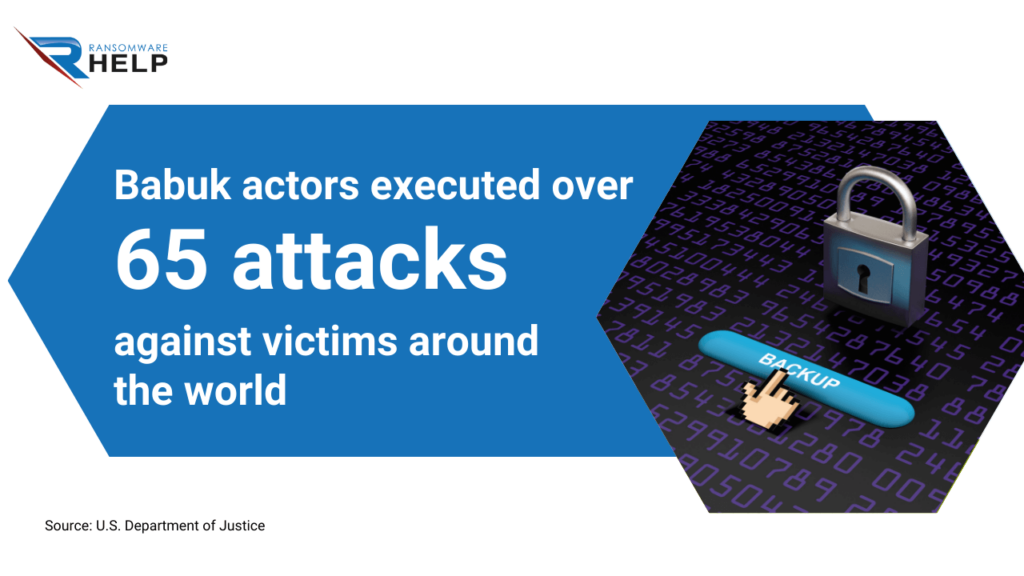
What are Babuk ransomware features?
Babuk ransomware features include:
- File encryption: Babuk uses strong cryptographic algorithms to encrypt the victim’s files and blocks access to their data unless the specific decryption key is released;
- Data theft: before encrypting files, Babuk can steal and exfiltrate a victim’s sensitive data, increasing the risk and impact of the attack;
- Ransom note: after file encryption, Babuk displays a ransom note asking for cryptocurrency payment in exchange for the decryption key;
- Spreading through phishing: Babuk ransomware primarily spreads through phishing emails containing malicious attachments or links to compromised websites;
- Business-targeted attacks: Hackers have used Babuk to target companies and organizations worldwide to obtain monetary gain through the ransom.
According to McAfee, the United States, Spain, Italy, the United Kingdom, Germany, South Africa, India, China, and the United Arab Emirates are the countries most affected by Babuk ransomware;
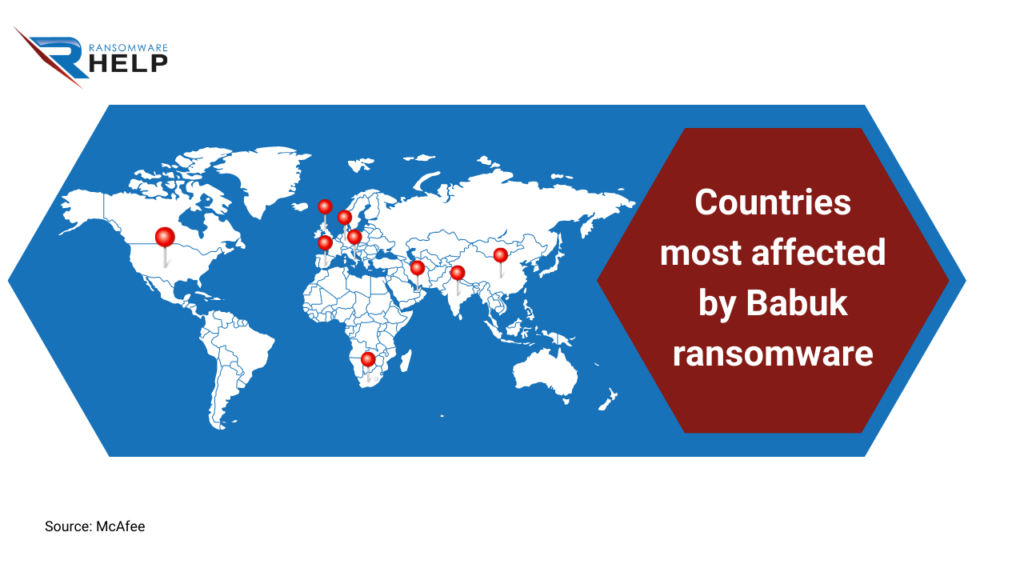
- Potential damage to systems and data: file encryption by Babuk can cause data loss and disruptions in business operations;
- Focus on ransom: The primary motivation behind Babuk is financial gain, and attackers often demand hefty sums from victims to release the ransomware decryption key.
Likewise other types of ransomware, Babuk can evolve as cybercriminals modify and improve codes to avoid detection and implement new effective methods.
A recent SentinelLabs research ‘identified an increasing trend in 2022 and 2023 of Babuk’s source code adoption.’
How does ransomware work?
Babuk ransomware typically infiltrates a system using social engineering techniques, phishing emails, or exploiting the vulnerabilities in outdated software.
Once it runs on the victim’s system, Babuk searches and encrypts files using cryptographic algorithms.
Subsequently, it displays a ransom note asking for cryptocurrency payment in exchange for the decryption key.
As the Justice Department reports, ‘Babuk actors issued over $49 million in ransom demands, receiving as much as $13 million in payments from the victims.’
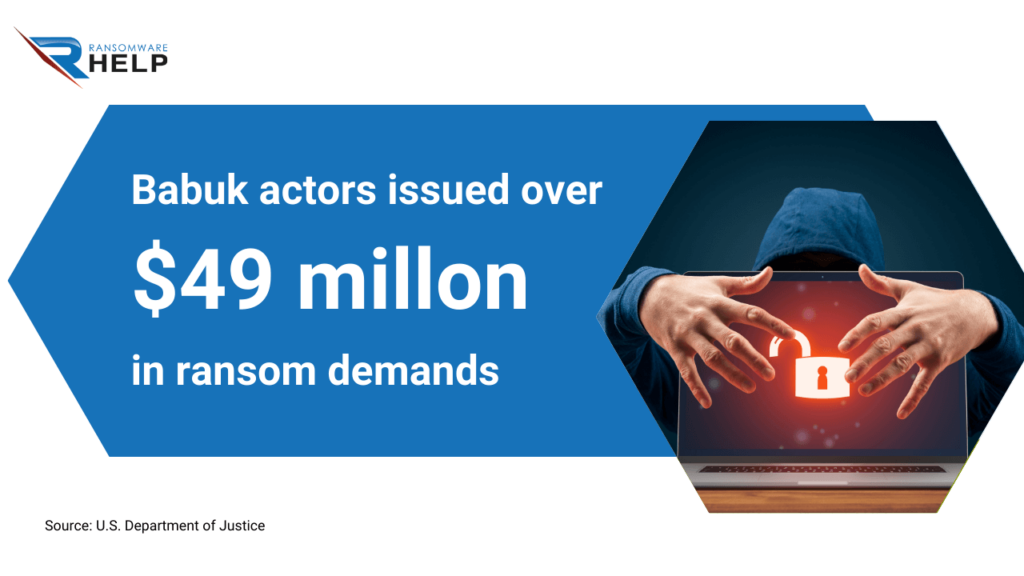
What are the early signs of a Babuk ransomware attack?
Identifying a Babuk ransomware attack can be vital to react quickly and proactively.
Some common signs of a Babuk attack include failed access to essential files, changes to file extensions, ransom messages displayed on the desktop or folders containing the encrypted files, and text files detailing instructions for paying the ransom.
How is Babuk ransomware spread?
Babuk ransomware is primarily distributed through standard techniques like email phishing campaigns.
The cybercriminals behind Babuk send deceptive emails containing malicious attachments or links to compromised websites.
These emails are designed to appear legitimate and commonly use social engineering techniques to trick recipients into opening attachments or clicking on links.
Once they open the file or access the malicious website, Babuk silently installs itself on the victim’s system and begins the encryption process.

The impact of Babuk ransomware attacks
Babuk ransomware attacks have a considerable operational and financial impact on the affected organizations.
Encryption of critical files can cause the loss of valuable data and affect business continuity.
Furthermore, ransom demands are often high, leading to considerable financial costs for victims.
It is also worth noting that paying the ransom does not guarantee that the files will be released.
HelpRansomware, an expert in cybersecurity and ransomware removal, strongly advises victims not to pay the ransom since it is illegal and there is no certainty to recover encrypted files.

Expert Ransomware Removal
Our certified professionals have over 25 years of experience in ransomware removal, data recovery, and computer security.
How does Babuk ransomware affect your computer and data?
Babuk ransomware is a highly pernicious danger that can considerably harm the victims’ computers and data.
Its primary attack mode is file encryption using robust and sophisticated cryptographic algorithms.
Once the files are encrypted, they become inaccessible, and using them is impossible without the corresponding ransomware decryption key.
It can devastate business operations, losing critical data or rendering it inaccessible.
In addition to encryption, Babuk can also exfiltrate sensitive data before encrypting it.
As a result, cybercriminals can access sensitive and personal information, raising the probability of data leaks and privacy violations.
According to IBM, the total data breach cost in 2022 was $4.35 million.
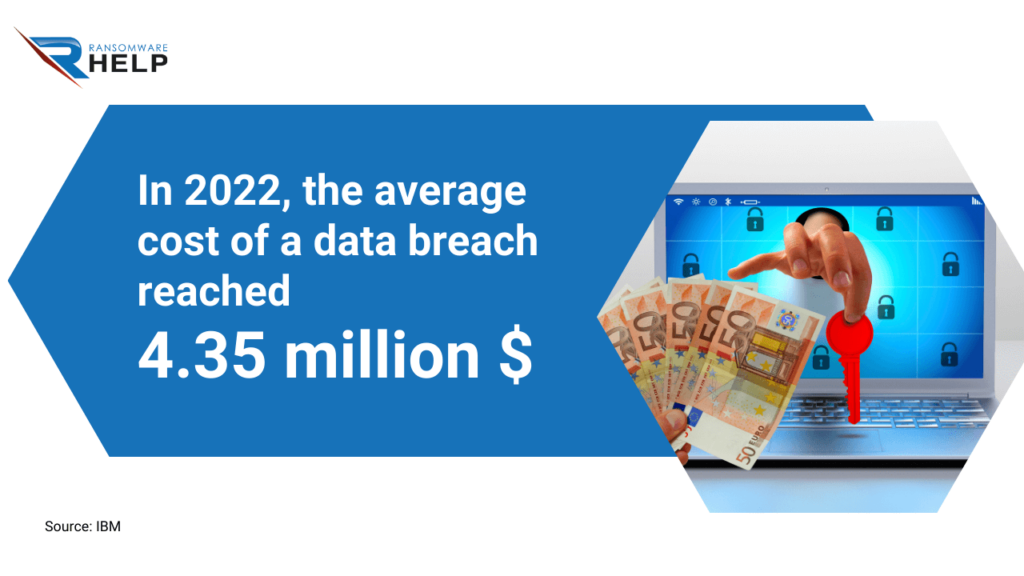
The potential damage goes beyond losing files, as Babuk can cause significant disruption to systems, generate lost productivity, and increase costs of recovery or mitigation from the attack.
How to protect your business from Babuk ransomware?
Combining multiple security measures is critical to protect your business from Babuk ransomware:
- Keep your software up-to-date: Apply patches and security updates to operating systems, applications, and programs. This shields known vulnerabilities that cybercriminals can exploit;
- Use robust security solutions: Employ up-to-date and reliable antivirus, anti ransomware, and firewall solutions to detect and block threats.
Evaluate advanced protection software that includes behavior analysis and detection technology.
According to CybelAngel’s 2022 report, 70 billion exposed files were detected last year;
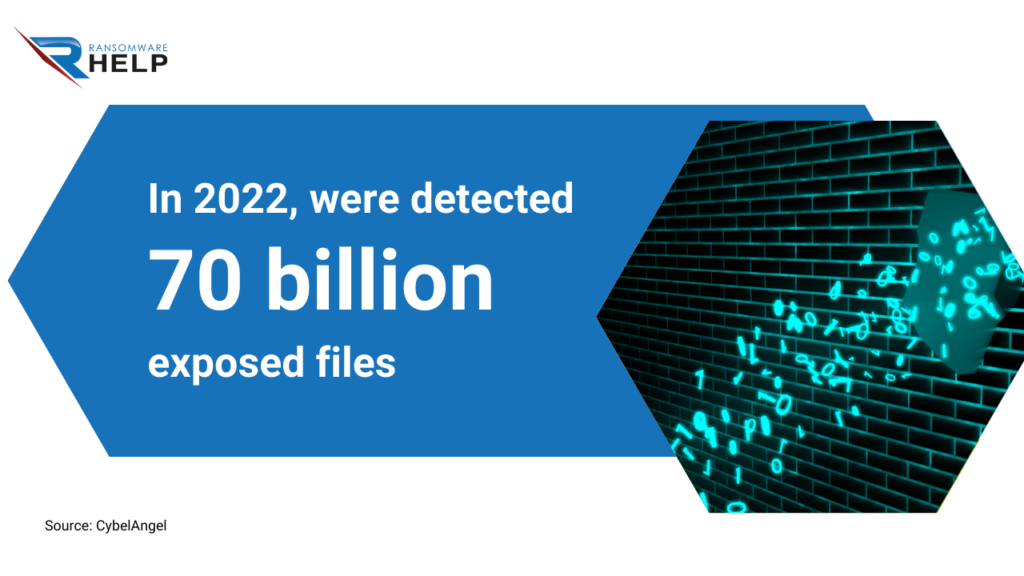
- Make regular backups: create frequent copies of your sensitive data and store it in a location out of the reach of ransomware, like in a secure cloud or on a disconnected storage device;
- Train employees: provide regular training on cybersecurity awareness, especially to detect phishing emails, malicious downloads, and secure online practices.
Employees are the first line of defense, and their expertise can help prevent ransomware attacks;
- Establish security policies: implement policies and procedures to use corporate systems and data safely.
That implies using strong passwords, two-factor authentication, restrictions on installing unauthorized software, and protecting mobile devices;
- Monitor and audit systems: Conduct regular security audits to identify and address vulnerabilities in your company’s systems and networks.
Monitor traffic and suspicious activity for early-stage attacks.
Remember that cybersecurity is a continuous and constantly evolving process.
Keeping abreast of the latest ransomware threats and trends is paramount in protecting your business from Babuk and other similar malware variants.
Recent instances of Babuk ransomware attacks
The U.S. Treasury Department detected an attack on the Washington D.C. Metropolitan Police Department network on April 2021, a noteworthy instance.
The attackers used Babuk to encrypt the files and demanded a ransom for their release.
This incident shows that government organizations are not exempt from being victims of ransomware attacks.
In May 2023, U.S. authorities announced punishments, financial penalties, and a reward of $10 million for information leading to the arrest of the person behind these ransomware attacks.
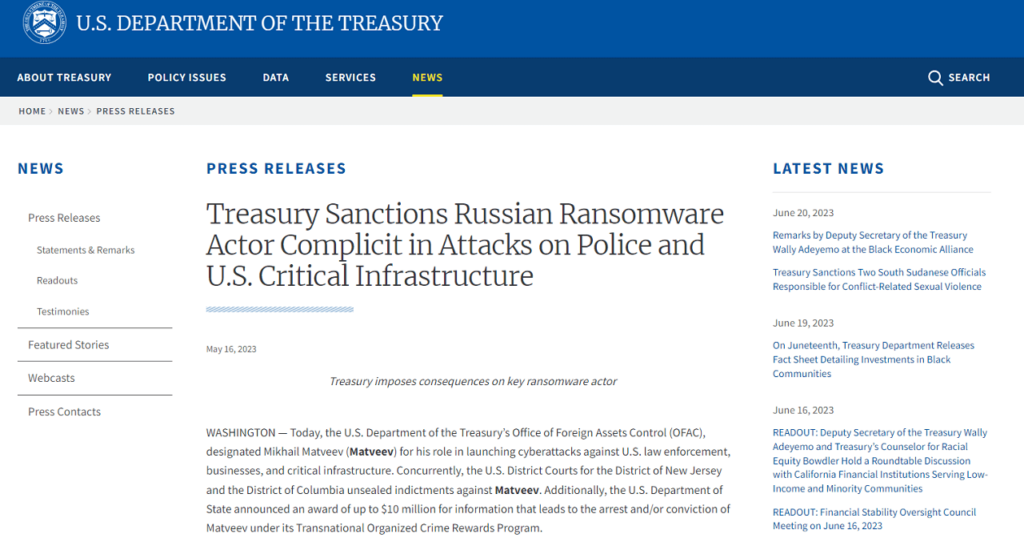
Tips for detecting and responding to ransomware
Detecting and responding to Babuk ransomware can make all the difference in recovering and mitigating the attack.
Here are some tips:
- Spot the signs of infection: keep an eye on the symptoms of a Babuk ransomware attack, such as file encryption with unusual extensions, ransom notes, and pop-up messages demanding a ransom;
- Disconnect the infected system: if you suspect that Babuk has compromised your system, disconnect it immediately from your network to prevent malware from spreading and protect other devices;
- Notify law enforcement and the security team: Make your internal security team and local authorities or cybersecurity agencies aware of the incident.
Provide relevant details and evidence such as phishing emails or malicious files;
- Refrain from paying the ransom: It’s essential to recall that there is no certainty that cybercriminals will keep their promise and decrypt ransomware files.
Moreover, paying out encourages future attacks and funds criminal activities;
- Revert to backups: If you have up-to-date and secure backups, use them to restore your affected files and systems.
Make sure backups are secure from potential ransomware attacks;
- Learn from experience: Following a Babuk ransomware attack, undertake a thorough assessment to identify security breaches and areas for improvement.
Use this occurrence to strengthen security measures and prevent future attacks.
Prevention and preparedness are vital to protecting your business from Babuk ransomware.
Keep your systems up-to-date, make regular backups, and educate your staff about cybersecurity best practices.
HelpRansomware can help you remove ransomware and decrypt encrypted data.
Its experts decode RSA and AES algorithms used by governments, ISPs, technology, financial, and telecommunications industries.
Immediate Ransomware Help
Don’t let ransomware hold your business hostage. Our experts are ready to recover your data and secure your systems.
What should businesses consider when facing Babuk ransomware?
Here are some key considerations:
- Preparedness and planning: Companies should have incident response plans in place, encompassing measures to restrain the spread of malware, restore data from backups, and interact with pertinent authorities;
- Risk assessment: Regularly assess risks to identify and address any vulnerabilities in company systems.
I.e., carrying out security audits, gauging the potential impact of ransomware attacks, and devising controls to mitigate the ascertained risks;
- Education and awareness: Train employees about cybersecurity practices.
Fortify your first line of defense, thus decreasing the chances of a successful attack.
According to the Gartner report, by 2025, lack of talent or human failure will be responsible for over half of significant cyber incidents.
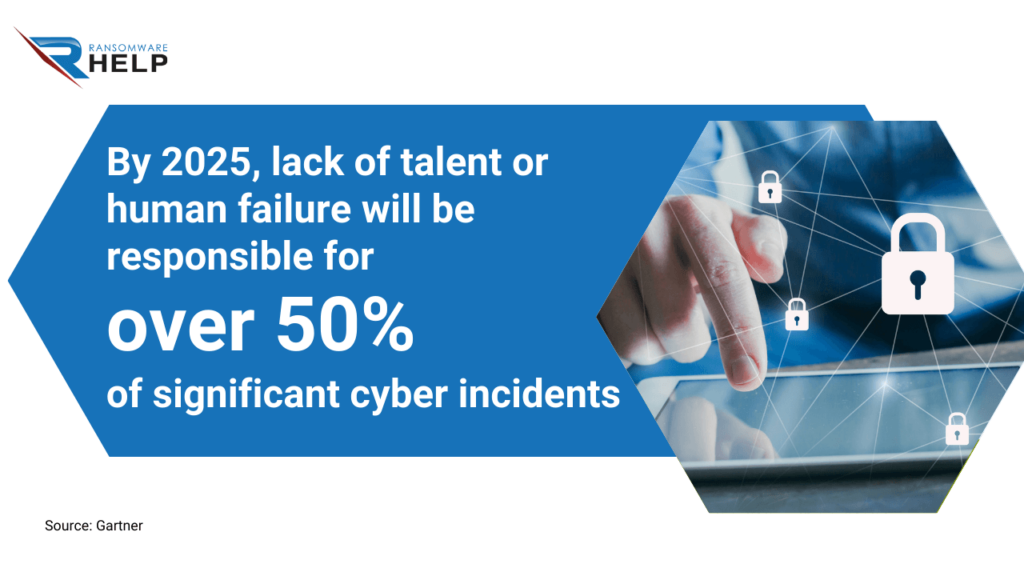
- Network segmentation and access privileges: Implement security measures, such as network segmentation, to restrict the spread of ransomware in the event of an attack.
Grant minimum access privileges only to authorized employees to access resources or data.
That will reduce the attack area and prevent ransomware from spreading in case of infection;
- Monitoring and early detection: Behavior, traffic analysis, and early warnings to spot signs of a potential Babuk attack.
These measures enable prompt response and containment of the attack before it causes significant damage;
- Effective response and recovery: isolate and disconnect affected systems, work with cybersecurity professionals, and evaluate the possibility of data recovery without paying the ransom.
Companies are the main targets of ransomware as they store valuable data, and cybercriminals demand huge ransoms.

Immediate Ransomware Help
Don’t let ransomware hold your business hostage. Our experts are ready to recover your data and secure your systems.
Conclusions
In this guide, you have learned about Babuk ransomware, a potential threat to your company’s security, and how to protect data from attacks.
We can draw the following conclusions from this article:
- Babuk was first identified in December 2020;
- This ransomware encrypts files and exfiltrates victims’ sensitive data;
- It is distributed by phishing, attachments, or compromised websites;
- Babuk demands a ransom in exchange for the decryption key;
- According to the Gartner report, by 2025, lack of talent or human failure will be responsible for over half of significant cyber incidents;
- Protection against ransomware is achieved through the use of updated software, anti-ransomware, backups, and cybersecurity education, as well as other practices.
Not paying the ransom for Babuk and other ransomware is critical. Negotiating with cybercriminals is illegal and does not ensure data recovery.
If you need to decrypt your encrypted data, contact HelpRansomware, a leading ransomware removal and decryption company.




